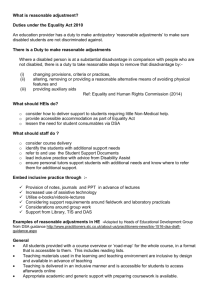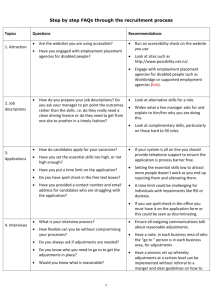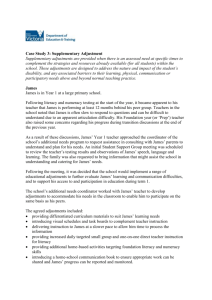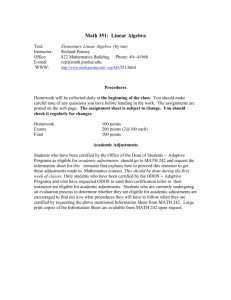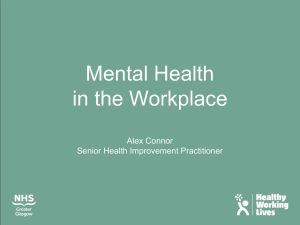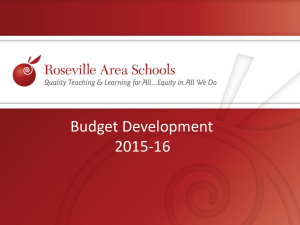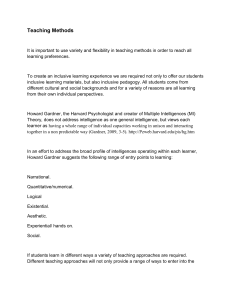Reasonable Adjustments in Academic Departments
advertisement
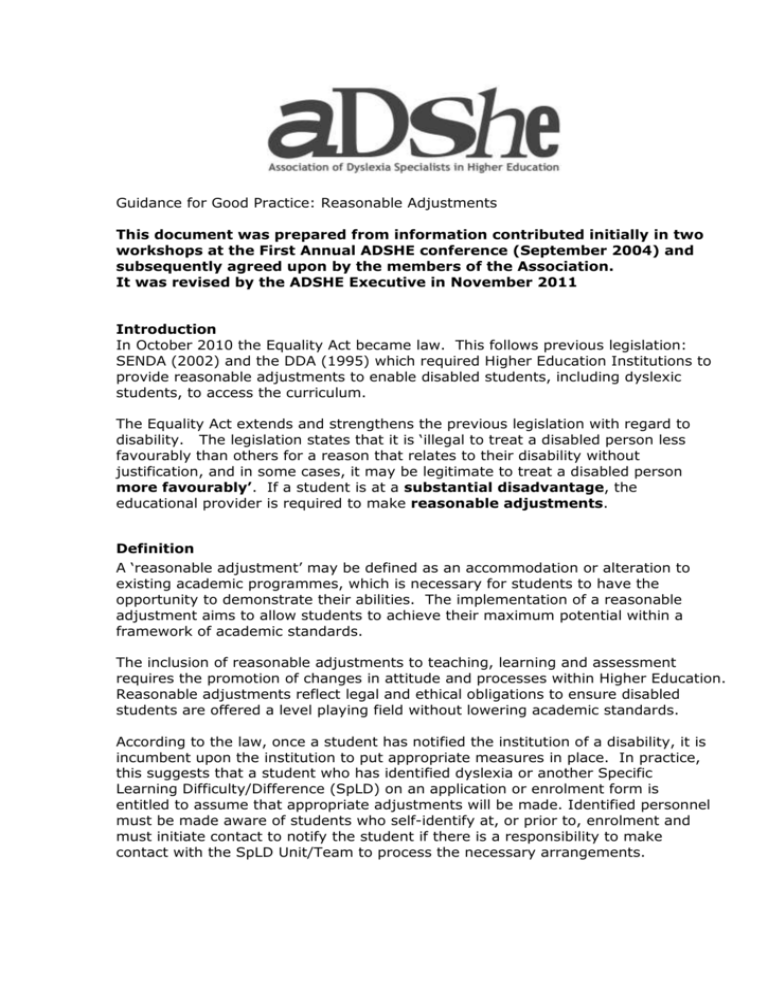
Guidance for Good Practice: Reasonable Adjustments This document was prepared from information contributed initially in two workshops at the First Annual ADSHE conference (September 2004) and subsequently agreed upon by the members of the Association. It was revised by the ADSHE Executive in November 2011 Introduction In October 2010 the Equality Act became law. This follows previous legislation: SENDA (2002) and the DDA (1995) which required Higher Education Institutions to provide reasonable adjustments to enable disabled students, including dyslexic students, to access the curriculum. The Equality Act extends and strengthens the previous legislation with regard to disability. The legislation states that it is ‘illegal to treat a disabled person less favourably than others for a reason that relates to their disability without justification, and in some cases, it may be legitimate to treat a disabled person more favourably’. If a student is at a substantial disadvantage, the educational provider is required to make reasonable adjustments. Definition A ‘reasonable adjustment’ may be defined as an accommodation or alteration to existing academic programmes, which is necessary for students to have the opportunity to demonstrate their abilities. The implementation of a reasonable adjustment aims to allow students to achieve their maximum potential within a framework of academic standards. The inclusion of reasonable adjustments to teaching, learning and assessment requires the promotion of changes in attitude and processes within Higher Education. Reasonable adjustments reflect legal and ethical obligations to ensure disabled students are offered a level playing field without lowering academic standards. According to the law, once a student has notified the institution of a disability, it is incumbent upon the institution to put appropriate measures in place. In practice, this suggests that a student who has identified dyslexia or another Specific Learning Difficulty/Difference (SpLD) on an application or enrolment form is entitled to assume that appropriate adjustments will be made. Identified personnel must be made aware of students who self-identify at, or prior to, enrolment and must initiate contact to notify the student if there is a responsibility to make contact with the SpLD Unit/Team to process the necessary arrangements. Each HEI will have their own process for ensuring RAs are put in place. This document provides some examples of how this process can be carried out and what these reasonable adjustments might be. The following can be considered reasonable administrative adjustments: Library Adjustments or Enhanced Library Membership Use of the library can present problems for students with SpLDs, in relation to orientation, direction, locating books, understanding how to use the library catalogue, etc. Although many universities offer induction sessions to new students, studenets with SpLDs often find it difficult to process the vast amount of information offered within a short time period. To accommodate the needs of these students, some institutions have chosen to identify one or more named librarian(s) willing to provide special induction sessions and on-going support. Students with SpLDs also benefit from extended loans on books, to address the pressure created by slow reading. Administratively, this requires systems to be put in place both to inform students of the availability of this accommodation, as well as to ensure that library staff are familiar with how to implement the arrangement. In some cases, special cards are given to identified students; in others the information is stored on the computer system. Some institutions abandon fines for overdue books, while others have elected to reduce fines to half the usual rate. Exam Arrangements: Perhaps the main administrative challenge to institutions for implementing reasonable adjustments is related to the area of examinations. There is currently considerable variation in the arrangements made at different institutions, both in terms of the student’s responsibilities as well as in terms of who within the institution is identified to organise the recommended arrangements. Most institutions define a period of ‘notice’ (which may be up to six weeks) to ensure that recommendations are implemented. If the student has not notified the relevant person before the specified date, it is possible that exam adjustments will not be put in place. This requires a clearly defined set of expectations that is easily available to all students. Institutions should provide extensive publicity about the need for students to apply early for exam arrangements. Deadlines for applying as well as a clear statement of steps to follow must be made explicit to students and the responsibility for communicating procedures must be assumed in the first instance by the institution. Once students have been made aware of what they must do to set up their exam provisions, it is then incumbent upon them to follow the necessary steps. In some cases, this may mean liaising directly with the Examination Office; in others it may necessitate that the dyslexia coordinator/tutor communicates with the student’s department. Assistive Technology and other Provision Students with SpLDs who rely on AT and for whom this is their normal method of working, may reasonably expect to be able to use AT in examinations. This may include the use of a computer and, in some instances, specialist software such as a Screen Reader or Voice Recognition. In some institutions, the spellchecker is disabled. Where recommended, an amanuensis or audio-taped papers can also be provided. Many institutions provide a flagging system, such as a sticker indicating that the script was submitted by a SpLD student, and that markers should take this into consideration when marking. It is up to the student to decide whether to use this flagging system. However, before any of these adaptations are made, consideration must be given to the disability-related need as well as to ensuring a levelling of the playing field with non-dyslexic peers, while not advantaging the student. Ensuring confidentiality Students have a right to confidentiality in relation to their disability. Many institutions require students to sign a consent form permitting information about their SpLD to be shared. If a student declines to sign such a form, the institution might refuse to make special arrangements. However, all systems within the university must respect the notion of confidentiality, and students should be made aware of who (both within and outside the institution) might be contacted (e.g. awards officers in LEAs, librarians, exam officers, academic tutors, etc.) Examples here of consent form/disclosure forms.. The following can be considered reasonable adjustments for academic departments: It should be noted that, in many cases, these recommendations reflect good teaching practice for all students. This not an exhaustive list. Lectures: Preparation Provide a course overview or ‘road-map’ for the whole course State learning outcomes at the outset of each lecture Handouts Handouts should be available in advance on line *Use a clear font (e.g. Arial) of at least 12 point Use non-glare cream/ivory paper (or a different colour which might be recommended for a particular student) for handouts Provide a clear structure which offers a simplified version of the lecture Reading lists to be included in handouts If academics suggest students do not attend lectures if given notes in advance, they could be referred to a survey carried out at the University of Durham. This showed that only 3% of students indicated that they did not attend lectures if given notes in advance. The main reasons given by students for non-attendance were early starting times and boring lecture style. Access to lecture topics Lectures to be recorded and made available from the library Students to be allowed to make personal recordings of lectures Arrange for a single note taker for each lecture on a rota basis from among the students Student helpers or support workers may be appropriate to act as scribes; payment is available in some universities or as part of the DSA; Multi-sensory presentation to appeal to all learning styles Named contact in library Extended loans for library material Reasonable adjustments in relation to tutorials/seminars: Students should be allowed to record the tutorial if they find note taking difficult A summary of the tutorial should be made available References to literature should be written down and given verbally. Tricky names/spellings should be spelt out Confidentiality should be respected Students should not be asked to read aloud without prior preparation and agreement Coursework: Feedback Tutors to give written essay feedback in a word processed format especially if their handwriting is difficult to read Flexible access to tutors for follow up questions Time Limits on Coursework: There should be a rigorous whole institution policy so that (all) students know what to expect Communication between departments to establish agreed time-limits is essential Departments to ensure that deadlines for assignments are staggered If departments offer joint courses, deadlines to be checked with the cooperating department Extensions should not be automatic but granted if applied for and supported by a good case as with all extenuating circumstances Specific Learning Difficulties are not generally considered as a sole justification for extension as multiple extensions could lead to additional problems Advanced time scales in course outlines should assist planning Long lead time to be given for all assessments on fieldwork and placements Students to be expected to hand in a plan or mind map on the due date even if granted additional time based on extenuating circumstances Where appropriate draft work should be accepted for checking well ahead of the deadline A range of alternative forms of assessment could be considered including: Oral presentation of work should be allowed in the form of vivas, but both staff and students need training in the use of vivas to meet the learning outcomes of courses When allowed, vivas should be recorded for external examiners When recommended, students should have the option of presenting coursework instead of doing examinations Examinations with an open book provision should be allowed Audio or video presentations should be allowed for students who find direct presentation difficult (e.g. due to expressive language difficulties) Mind mapped presentations may be acceptable for some assessment components Practice items should be readily available and marked if requested Projects and work of a more practical kind, may be acceptable alternatives to dissertations Portfolios or presentations may be acceptable alternatives to essays Short answer responses may be an acceptable alternative to essays in some contexts The use of voice activated software should be allowed if needed The use of text reading software, for example, Texthelp Gold should be allowed if needed Double marking of work in terms of looking at its content and then its form should be considered In examinations, students should have additional time, and if necessary the use of information technology with the facility to change the background colour and font, access to large print versions of the questions and the services of a reader or amanuensis Alternative forms of assessment need to be reviewed at Academic Progress Review Boards Alternative forms of assessment should be included in the validation of new courses What might be considered an unreasonable adjustment? The provision of unlimited time in examinations would generally be considered an unreasonable adjustment. The amount of additional time allowed must be justifiable based on the nature and degree of the individual’s difficulties Reduced workloads are unreasonable in that they could be seen as lowering standards Extreme demands on lecturers’ time would be viewed as unreasonable Any adjustment that gives the student an unfair advantage. Note: Issues of parity need to be further investigated in relation to both alternative assessment and allocation of time by lecturers. Fairness does not mean treating everyone in the same way; rather it suggests the need to treat each individual according to his or her need. Examples of good practice: The following provisions were adapted by the Open Language Programme at London Metropolitan University to help students with Specific Learning Difficulties compensate for problems with poor working memory: Additional time in aural examinations and provision of language laboratory so that dyslexic students can replay tapes as often as they wish during their extra time Additional time and repetition of instructions in oral examinations The School of Nursing at Thames Valley University ensured that a severely dyspraxic student with a writing speed of 10 wpm was not disadvantaged: Provision of Log Book, normally completed by hand on hospital placement, provided on CD-Rom Who is responsible for the implementation of reasonable adjustments? University wide policies need to be developed to ensure consistency and transparency of provision. In the event of conflict, provision should be made for mediation and a system of appeals should be in place. Rreasonable adjustments are the responsibility of all staff. Possible problems concerning professional bodies: Professional bodies are sometimes reluctant to offer reasonable adjustments in relation to professional examinations. However, they are included under the legislation and appropriate adjustments should be put in place.
